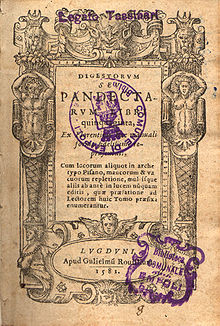- Digest (Roman law)
-
The Digest, also known as the Pandects (Lat. Digesta seu Pandectae, adapted from Gr. πανδέκτης pandektes, "all-containing"), is a name given to a compendium or digest of Roman law compiled by order of the emperor Justinian I in the 6th century (AD 530-533).
The Digest was one part of the Corpus Juris Civilis, the body of civil law issued under Justinian I. The other two parts were Institutiones, and the Codex Constitutionum. A fourth part, the Novels (or "Novellae Constitutiones"), was added later.
The Digest is divided into fifty books, each book containing several titles, divided into laws, and the laws into several parts or paragraphs. The number of jurists from whose works extracts were made is thirty-nine, but the writings of Ulpian and Paulus make up almost half the work[citation needed]. The work was declared to be the sole source of non-statute law: commentaries on the compilation were forbidden, or even the citing of the original works of the jurists for the explaining of ambiguities in the text.[1] The principal surviving manuscript is the Littera Florentina.
See also
External links
- Roman Law Resources - a very good collection of resources maintained by Professor Ernest Metzger.
- The Roman Law Library - by Professor Yves Lassard and Alexandr Koptev.
 "Pandects". Catholic Encyclopedia. New York: Robert Appleton Company. 1913.
"Pandects". Catholic Encyclopedia. New York: Robert Appleton Company. 1913.
Notes
- ^ Ferdinand Mackeldey Handbook of the Roman Law pp. 57-58, citing Const. Tanta, § 21; Const. Dedit § 21.
 This article incorporates text from a publication now in the public domain: Chisholm, Hugh, ed (1911). Encyclopædia Britannica (11th ed.). Cambridge University Press.Categories:
This article incorporates text from a publication now in the public domain: Chisholm, Hugh, ed (1911). Encyclopædia Britannica (11th ed.). Cambridge University Press.Categories:- Roman law
- Byzantine law
- Latin prose texts
- 6th-century books
- Law books
- 6th century in law
- Justinian I
Wikimedia Foundation. 2010.

